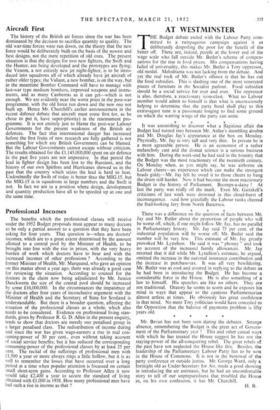Professional Incomes
The benefits which the professional classes will receive under the 1952 Budget proposals must appear to many doctors to be only a partial answer to a question that they have been asking for four years. That question is—when are doctors' incomes, which are to a great extent determined by the amount allotted to a central pool by the Minister of Health, to be brought into line with the rise in prices, with the very heavy burden of work which doctors have to bear and with the increased incomes of other professions ? According to the former Minister of Health, Mr. Marquand, who gave an opinion on this matter about a year ago, there was already a good case for reviewing the situation. According to counsel for the doctors in the claim now being adjudicated by Mr. Justice Danckwerts the size of the central pool should be increased by some £16,000,000. In the circumstances the impatience of the doctors after four years of inconclusive argument with the Minister of Health and the Secretary of State for Scotland is understandable. But there is a broader question, affecting the situation of the professional classes as a whole, which also needs to be considered. Evidence on professional living stan- dards, given by Professor R. G. D. Allen in the present enquiry, tends to show that doctors are merely one penalised group in a larger penalised class. The redistribution of income during and since the war has given wage-earners a rise in real con- suming-power of 30 per cent., even without taking account of social service benefits; but it has reduced the corresponding consuming-power of the professional classes by at least 25 per cent. The recital of the sufferings of professional men with £1,500 a year or more always rings a little hollow, but it is as well to remember the losses that have occurred over a long Period at a time when popular attention is focussed on certain small short-term gains. According to Professor Allen it now would take £2,400 a year to secure the standard of living obtained with £1,000 in 1938. How many professional men have had such a rise in income as that ?


































 Previous page
Previous page